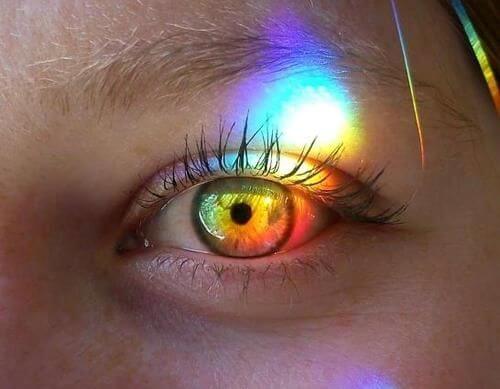The Eyes Never Need Subtitles

The eyes of a laughing child are the reflection of the most sincere and spontaneous happiness. The glow of someone who looks after these little ones is nothing less than an open book. Humans speak with their eyes, and this is a language that doesn’t need words or subtitles: it uses the power of the emotions that come from inside of us.
The eyes are also the most powerful indicators of our mood, and not only that, according to several studies, many of our intentions can be foreseen in our eyes, whether they be good or bad ones. They are our best channel to connect with those around us and to show maybe affection, repulsion, fear or discomfort.
The eyes are the messengers of the soul, because while words can be loaded with falsehood, our eyes are the windows of the heart and the language emotions: they do not need subtitles.
One question that always comes up regarding our eyes, from a psychological point of view is whether someone can actually deceive someone with their eyes. The answer is yes, however, they are usually people with a great command and mastery of non-verbal language. Please read on to get to know more about this interesting topic.

The eyes and the mystery of the pupils
Eckhard Hess was a psychologist and ophthalmologist whose wife told him something that caught her eye while she was watching him reading in bed. Watching her husband engrossed, Mrs. Hess realized that the pupils of her husband’s eyes dilated at certain times and then contracted a second later.
Dr. Eckhard Hess, intrigued by what his perceptive wife had observed, didn’t waste any time in doing a small experiment the next day with his male students at the University of Chicago (1943 was the year). The test was simple: he offered them a book, and between the sheets he hid some photographs of Playboy girls. And there it was, in an instant, that unexpected visual impact produced a fascinating dilation of their pupils.
Eckhard demonstrated that the autonomic nervous system, which is in charge of regulating our involuntary actions, is closely related to emotional power. When we perceive something that we consider to be interesting – as it was in his case – or if we maintain a rewarding conversation, our pupils dilate. The same thing happens when our eyes suddenly “stumble upon” something exciting, something that we like or that attracts us: the eyes are surrounded by the blackness of our pupils.

The mystery of the pupils has always been a fascinating subject that has taught us basically two things: the first is that pupil dilation is not only produced by the lack of light. The second is that the pupils are intimately related to our emotions and that their dilation is an involuntary act, it is the purest and most complete reflection of our drives and feelings.
When the look is sincere, it becomes the bridge between two souls
The gaze of a person can sometimes be a map of the affections, inner calm and peace that connect immediately with our inner being. At other times, however, the ocean of their irises reflect our journeys of grief and disappointment. The eyes not only tell a lot about our own personal stories, but also about how we relate to others.
The one who looks outwards dreams, the one who looks inwards wakes up
The way we gaze is a way of having feedback and, in turn, a signal of synchronization – or lack thereof – between two speakers. The most harmonious dialogues are the ones where people look into each other’s eyes, listen and empathize. On the other hand, we can also find other friends who usually tend to avoid eye contact, who “escape” towards the sidelines, lower their eyes and avoid us.
Social anxiety, shyness or introvertedness sometimes act as guides for those looks that come and go, that do not stay too long on their faces because of discomfort, fear or indifference. In these cases, it is very difficult to create bridges and establish an adequate emotional bond.

One aspect that is also interesting is the one that was demonstrated in the University of Cambridge by the doctor Simon Baron-Cohen. Thanks to different tests carried out over several years, it was discovered that women are much more skilled in deciphering the emotions and intentions of another person by interpreting a look from the eyes.
Both men and women obtained similar scores when interpreting the non-verbal language of the body. However, the eyes are always a hidden world, being at the same time full of meaning, which a skilled feminine look can sense and decipher.
And so it seems that often, as the saying goes, the eyes give away what the heart tried to hide.

This text is provided for informational purposes only and does not replace consultation with a professional. If in doubt, consult your specialist.








